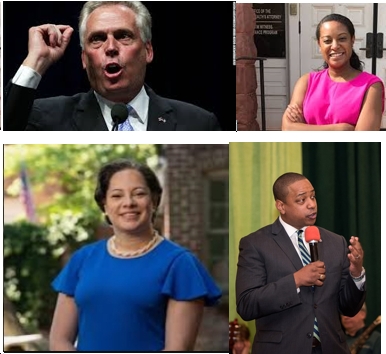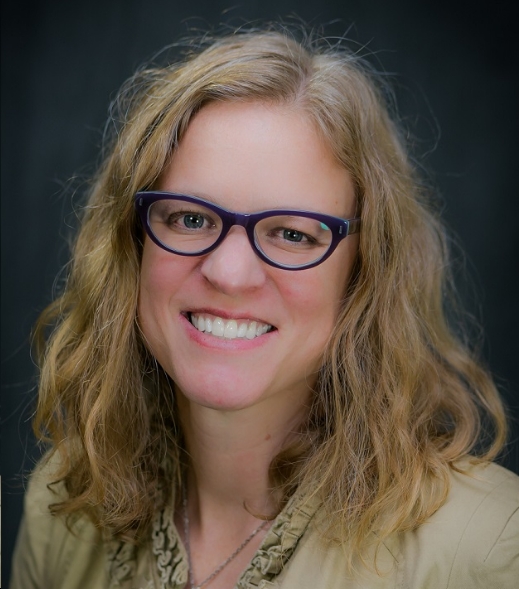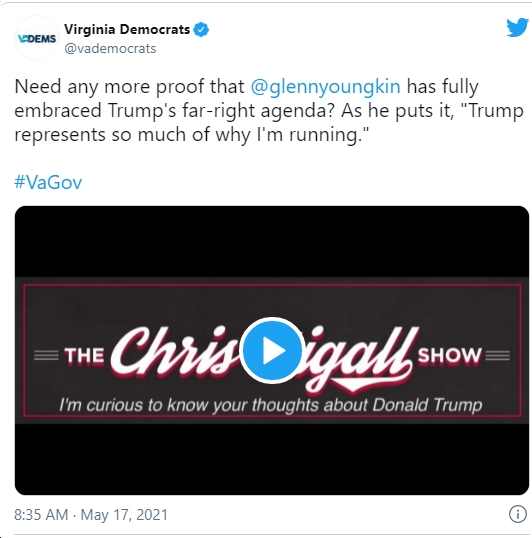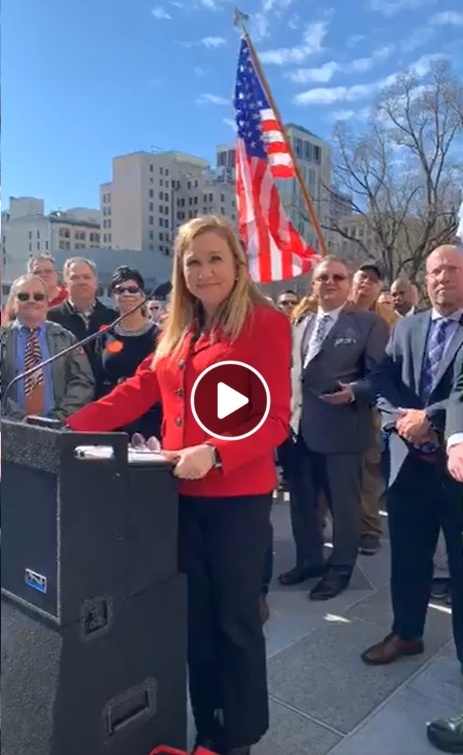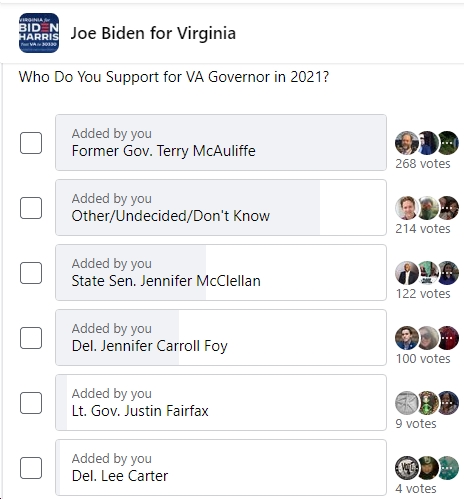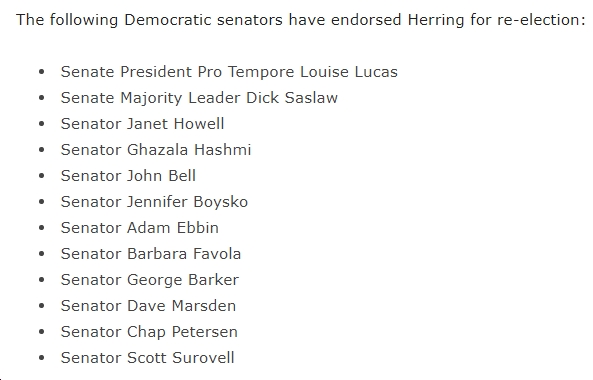Great job by Kellen Squire and thanks for interviewing the Democratic candidates for statewide office. Here’s Kellen’s interview with AG Mark Herring, cross-posted from Daily Kos.
KELLEN SQUIRE: Okay, Attorney General Herring, thank you for taking the time to answer some questions. You’re running for attorney general for what is possibly an unprecedented third term, and I know some have said you’re the “old guard”—both in positive and not-so-positive ways. I just wanted to hear your take on that.
VIRGINIA ATTORNEY GENERAL MARK HERRING: Well, I am the new guard. If you think about it, I’ve been the one breaking barrier after barrier after barrier for progressive causes. And I’ve been a big reason why it’s been safe for Democrats to do so much of what we’re doing right now.
You couldn’t get a statewide Democrat to speak up for marriage equality until I did. You couldn’t get Democrats to speak up for the immigrant community, or run on a platform of strong gun safety laws for marijuana legalization, until I lead on those things. When Michael Brown’s killing shook our nation, I started calling for police reforms and 21st-century policing. I made it okay for Democrats to own all of these issues, and really help initiate that political change.
For me, I was just doing what I thought was right, to help as many people as I could, not weighing out the politics of it. My feeling was I worked really hard to get elected attorney general, and I had four years to know what the future was going to hold. But I was determined to make the most of those four years, and do as much as I could help as many Virginians as possible. And then I’ve continued that, ever since.
So, you know, my feeling was, it was a really close election back in 2013. When the recount completed, and I was declared the winner, it was only two weeks later that I was sworn in. And two weeks after that, I went into court and said no, I’m not going to defend that unconstitutional ban on marriage for same sex couples, we’re gonna fight for marriage equality. And I think, coming so close on the heels of that very close election, it really showed not just the activists, but everyone, how political activism in campaigns can result in policy change.
KS: So you mentioned marriage equality as the issue you worked on almost immediately after your incredibly close election in 2013. Whether it’s working as the attorney general, as a state senator, whatever the case may be: What are the most consequential pieces of legislation and/or cases you worked on? And how does it inform your priorities if you were to be reelected?
MH: If you look over the past seven years, there’s a lot to pick from there because so much of the work we’ve done has been so impactful. But I think right now, being a year into the pandemic, looking at the importance of how I’ve been able to defend people’s health care is huge. Because I’ve been to the Supreme Court now not just once but twice to defend the Affordable Care Act. I didn’t wait for Republican attorneys general to go find some ultra-conservative federal judge in Texas to file another legal challenge to it. I didn’t hesitate to find out what the Trump administration’s response was going to be. I went in knowing how important it was for Virginia, and Virginians, to make sure their health care was protected. So I went down to the federal court in Texas, and intervened in the case to make sure that Virginia’s voice was heard, and people’s health care was protected. We ended up going all the way to the Supreme Court a second time, and we’re waiting on that decision.
And as I think about how important those fights have been, how consequential they’ve been. Hundreds of thousands of Virginians get their health care on the Affordable Care Act exchange. Hundreds of thousands of Virginians now have health care because of Medicaid Expansion. Drugs are less expensive for seniors because of the Affordable Care Act. Protections against preexisting conditions are in the Affordable Care Act. If the Affordable Care Act is overturned by a legal challenge, all of that goes away. And the vast number of people who would be impacted if that were to happen is just staggering.
And it’s kind of easy to lose sight, when you consider the staggering number of people who will be impacted—it’s easy to forget the individual stories, how each and every person affected is so consequential. I remember talking to women who were breast cancer survivors, telling me if the Affordable Care Act goes away, or protections against preexisting conditions go away, how will I get health insurance? How will my family get insurance—at a price that they can afford? If we can’t, it just means our family is one serious illness away from being wiped out. That type of anxiety is really difficult for people.
So far, we’ve been able to successfully defend the Affordable Care Act. We’re still waiting on a decision out of the Supreme Court. I’m hopeful, and I’m optimistic that we’re going to come out on top, but we’ll have to wait and see. But that’s something I think just has such far-ranging implications for people, and especially because we’re in this pandemic—that’s one that lies on the top of my mind
KS: So, you know, there’s been a lot of talk about how much Virginia, and the country as a whole, have changed in the last eight, 10 years. We’ve seen things happen, both here in the Commonwealth, and across the country, that maybe didn’t seem like a big deal at the time but have since become huge. So over the last decade or so, what’s either the small thing that happened that was really way more pivotal than people like to think? Or, just overall, what was the most important event of the past decade that informs the future of us here in Virginia?
MH: I think it’s the rise in hate and white supremacy. That started off in small ways that a lot of people didn’t see. Now, we know that has always been out there, but we haven’t seen the huge rise in white supremacist violence until more recently. I saw it going back as early as 2015; I remember driving in my home county of Loudoun, seeing anti-Hindu graffiti spray painted on an overpass, and I thought, “Where is this coming from?! This is Northern Virginia. We pride ourselves on our diversity.” And not long after that, I heard about some KKK flyerings in Northern Virginia neighborhoods. Once again, it’s like, “Where’s this coming from?”
And then the campaign of Donald Trump came along, and just emboldened all of it. We saw Jewish schools and community centers being targeted and threatened, we saw vandalism at mosques. And it just continued to escalate. And I started sounding the alarm bell because I knew this was a real threat with multiple impacts on us, because, first of all, white supremacist extremism and violence is a very real public safety threat. Not only that, it also has a caustic effect on society as a whole. And we have to combat that, or it will continue to get worse. You know, the Unite the Right rally in August of 2017—I don’t want to say “Charlottesville,” because Charlottesville is an amazing community and doesn’t deserve to be just a throwaway word for a white supremacist attack. But you know how awful that was. And that culminated in the kind of insurrection that we saw at the Capitol.
It’s just continued to accelerate. So we have got to take it as a serious threat to our safety, our democracy, and our ability to have an approach working with each other that allows us to solve our problems going forward.
KS: On that note, what is the single biggest challenge facing the Commonwealth right now?
MH: Well, I would say it’s exactly that same kind of the white supremacist, white nationalism movement that continues to feel emboldened by Donald Trump and the politicians who want to idolize him. The Jan. 6 attack on our capitol was an affront to both our democracy and the very foundations of our country, fueled by baseless conspiracy theories and lies, and it’s all rooted in white supremacy and antisemitism. It’s going to take all of us trying to work together to turn this around.
We have to recognize it as the public safety threat that it is. The threat to our democracy, which it is. And as for elected officials, for community leaders at every level, we need to speak out against it. We have finally gotten a legislature that is recognizing it, which has given us a few new tools to fight back. We’ve updated our hate crimes law. We have allowed localities now to ban firearms at permitted events. But we’re going to need to continue our efforts, and make sure that we get this problem turned around.
I’ve had a series of roundtables, both in Charlottesville and around the state, to talk about the rise in hate crimes that we’ve seen. And I had people at those roundtables sharing their experiences as a victim of hate crime, saying that they or their family moved to this country, into Virginia, 30 to 40 years ago, and they always—always!—felt so welcome. They never felt unsafe. And now in the last few years, they feel like they have to look over their shoulder. They’re given nasty looks on the street. They’re declined service at grocery stores. So this rampant white supremacy really has both a public safety impact, as well as this toxic effect on our society. And we have to work on that. The consequences for not [doing so] are dire.
KS: Virginia has off-year elections, and this one, like the election in 2017, comes on the heels of a very big and consequential presidential election. Obviously, the 2017 elections in Virginia were the first harbinger of the “Trump Era,” and sort of foreshadowed the “Blue Wave” of 2018.
So, here we are again. With all of the hatred you alluded to previously still out there, very ominously, I have to ask: Is 2021 in Virginia going to resonate in the same way as it did in 2017?
MH: Well, in Virginia, we are focused on how we can help each other, and get through the challenges we have. We’ve got a lot of work ahead of us to make it through and recover from the pandemic. We have other challenges that we’re facing. Folks from outside the Commonwealth are obviously going to be watching; Virginia is often seen as the first bellwether on newly elected administrations.
But my focus is going to be on doing everything I can to help Virginians. I’m running for reelection as attorney general to keep building on the incredible progress that we’ve made over the last eight years. When I took office, Republicans had been abusing the Office of the Attorney General like it was their own personal law firm.
Since then, we have totally transformed the office, and shown Virginians how much we can accomplish. The first thing I did, as I mentioned before, was to go in and fight for marriage equality, and not allow this discriminatory ban on same-sex marriage to continue. But beyond that—whether it’s helping to preserve Planned Parenthood [or] guaranteeing DREAMers an equal education in Virginia—there are so many other things the Office of the Attorney General has done for the people of Virginia.
But we have so much work left to do. And looking forward to my priorities for the next term are really in three main “buckets” to continue building on the tremendous progress we’ve made: focus more on racial justice and policing reform; health, safety, and well-being; and workers’ rights.
KS: Now, a quick aside: I’d like to ask you about Election Day in 2013. Eight years ago—I mean, that might as well be a generation or two ago with as much as has changed in the intervening time—I think a lot of people forget truly how razor thin the margin was on your race. I’ve found, for better or worse, close races tend to affect candidates. How did that race affect you, both then and now?
MH: Well, you know, one of the things I remember most is that a lot of people worked really hard on that campaign. Like I said, it was so close that the recount went into late December, until only a couple weeks before I was sworn in. And then a couple of weeks later, I was fighting for marriage equality. Because what that close win showed me was how the activists, the grassroots, really make a difference. They get involved in campaigns to elect people who are going to go out and fight for them, to make these policy changes that are really going to help the lives of their fellow Virginians be better.
So that’s what connects for me, and why I think it’s really important that, as a candidate, you work hard enough to honor that. Case in point: On Election Day, it’s traditional that the statewide candidates are together, and go traveling around the state. I remember Election Day in 2013, getting back into Dulles Airport—we got back a little bit earlier than we had planned, and so traditionally, this is when you’d take a little bit of a rest and get ready for election night.
But my campaign manager Kevin (O’Halloran) called me, and he said, “Hey, look—we’ve got a long line over at Carter precinct in eastern Loudoun. We really need you to get over there and encourage voters not to leave.”
So I stayed there until the polls closed, working as a poll greeter, and introduced myself to a lot of voters. It sounded like some of them were undecided on who they were going to vote for until we had a conversation. And think about that: The state-certified vote difference was 165 votes. Do we know the last couple of hours of Election Day, and those couple of precincts, made that difference of 165 votes? Maybe! I don’t know. We’ll never know for sure.
But my theory on that, as I said, is that you work as hard as you possibly can as a candidate. And if the vote goes the other way, that’s how it goes. But what I would not want to do is wake up the next morning having come up a little bit short, thinking there was actually more that I could have done, and disrespecting the grassroots volunteers who were the real reason we won. That’s why I always work as hard as I possibly can. Because then, it’s ultimately up to the voters.
The other story from 2013 I will never forget—I apologize, this gets into the weeds a bit, but it’s really stuck with me. So the week after Election Day is the time when the canvass happens, and the local electoral boards look very closely at those numbers and make sure that they’re getting everything exactly right. And there were some provisional ballots that were outstanding, and volunteers on both campaigns, both mine and Sen. Obenshain, were reaching out to those voters who had cast provisional ballots, encouraging them to go back in and correct whatever deficiency there might have been.
I stopped to thank some of our volunteers in Fairfax, and when I did, they said, “Hey, would you mind calling this one person back? Because we really—we just can’t do it. You need to be the one to call them.”
So they explained the situation. They called and asked if this voter would go back in to fix their ballot, which he did. But later, the electoral board voted not to count his ballot. Then a few hours after that, the electoral board was voting to count somebody else’s ballot, and our folks said, “Hey, wait a minute! This is just like that other situation you rejected!” So the board reconsidered their earlier vote, and voted to count the ballot … but only if the voter would come back in again and sign some other form. And the volunteers said, “You’re the candidate, you’re going to have to be the one to explain all of that, because they’ll never believe us.”
So I called this voter personally and left a message. Didn’t hear back. And I thought, “Well, I guess they’re not going to have their vote counted.” But then a couple of days later, out of the blue, he called me back, and told me that he’d gotten a phone call from an organization that he trusted. And on an issue that mattered most to him, that the attorney general’s race was the one that was really important in ensuring that issue would be addressed, and that I was the candidate they thought he should support and why. He told me that he was gay, that he was tired of being treated like a second-class citizen, and the reason he voted was to vote for me.
So he went back in and made sure that his vote counted. And he told me, “By the way, when you win, make sure you fight for the civil rights of all Virginians—not just the LGBT community, but everyone.”
And that just shows the connection between grassroots activism where voter to voter contact from a phone bank resulted in a vote—and in a very, very close election. Which is something I have carried with me ever since.
KS: To close things out, I have to know: Why is now the time for Mark Herring to be reelected attorney general?
MH: Over the last eight years I’ve totally transformed the office. When I said that the Republicans were using the office as their own personal law firm, using it to marginalize people, I wasn’t kidding. It’s why the first thing I did was go in and fight for marriage equality, fight for all Virginians. And since then, we’ve just totally transformed it and shown Virginians how much we can accomplish. Working together to preserve Planned Parenthood, guaranteeing DREAMers an equal education, doing so many other things. But there is still so much more we need to do.
For me, it’s the “three buckets” I mentioned earlier: racial justice and policing reform; health, safety, and well-being; and workers’ rights. In regards to the first one, racial justice and policing reform, our new Office of Civil Rights will allow us to really forcefully fight discrimination in housing, employment, and public life. We’ve been able to get authority to do pattern and practice investigations of law enforcement agencies, to identify and put a stop to systemic, unconstitutional policing practices, such as excessive force, bias policing, illegal searches. I absolutely plan to take full advantage of that new tool.
I’m going to fight for marijuana legalization. I know it’s been “passed,” but there’s still more work that has to be done in order to truly get it passed and implemented. And we have to, have to, deal with past convictions and find a pathway to make sure that we have record expungement.
I just completed the first ever investigation into systemic racism in a Virginia public school system. And now that that’s done, I’m hopeful that other school divisions around the state will take note that we are watching. We may have to wait. We may have to do more. But I plan to use that system that we created to investigate and resolve or settle cases of racial discrimination and apply them to other large-scale systems, like health care. And we have to continue to lead on ensuring that we implement 21st Century Policing training, something that we began back in 2015.
We are going to need to make sure that we successfully defend legal challenges to new gun safety measures like one gun a month, the Red Flag law, and expanded background checks. And there will be a need for additional legislation as well, to help keep our communities and neighborhoods safe. We need to ban the box for housing and ensure fair housing for Virginians experiencing reentry.
I would like to implement our value assessment training for local law enforcement officers to better protect and serve survivors of domestic violence. This is something that I started pushing shortly after I took office as a senator. I tried to get legislation passed, but it was unsuccessful. So when I was elected attorney general, I just started doing it—working with the domestic violence community around the state to get these implemented at a local level.
And then I’ve continued to fight to reach conclusions in our years-long battle to hold pharmaceutical companies accountable for their role in creating and prolonging the opioid epidemic, which has touched the lives of so many Virginians and Americans, and I’m sure in the healthcare space, as an ER nurse, you’ve seen a lot of that.
And then lastly, workers’ rights. My just-announced worker protection unit represents a new chapter in the fight to make Virginia a fair place for workers to live and raise their families. And it’ll also be a natural home for additional efforts to help working families in Virginia.
I know there’s a lot there, but that’s just some of the things that need to be addressed by the attorney general. And that’s why I’m running for reelection: so we can keep building on the incredible progress that we’ve made together.

